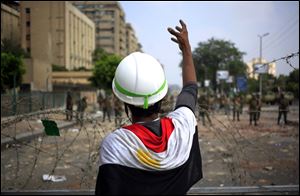
Egypt's Muslim Brotherhood rejects transition timetable set out by interim president
7/9/2013
Egyptian security forces killed dozens of supporters of Egypt's ousted president in one of the deadliest single episodes of violence in more than two and a half years of turmoil.
CAIRO — Egypt’s Muslim Brotherhood on today rejected a new timetable announced by the military-backed interim leadership that sets a fast track for amending the Islamist-drafted constitution and holding new parliamentary and presidential elections by early next year.
RELATED: Egyptian economist appointed prime minister
The quick issuing of the transition plan showed how Egypt’s new leadership is shrugging off Islamists’ vows to reverse the military’s ousting of President Mohammed Morsi and wants to quickly entrench a post-Morsi political system.
Egypt’s military also likely aims to show the United States and other Western nations that the country is moving quickly back to an elected civilian leadership. Washington has expressed concern over the removal of Egypt’s first freely elected president, and if the U.S. government determines that the army’s move qualifies as a coup it would have to cut off more than a $1 billion in aid to Egypt, mostly to the military. The Obama administration has said doing so would not be in U.S. interests.
Egypt’s political divide was only further enflamed Monday by one of the worst single incidents of bloodshed in 2 ½ years of turmoil: Security forces killed more than 50 pro-Morsi protesters in clashes at a sit-in by Islamists. The military accused armed Islamists of sparking the fighting, but Morsi supporters said troop opened fire on them without provocation after dawn prayers.
Since then, the military and allied media have depicted the campaign to restore Morsi as increasingly violent and infused with armed extremists. Islamists, in turn, have talked of the military aiming to crush them after what they say was a coup to wreck democracy.
Essam el-Erian, a senior Brotherhood figure and deputy head of its Freedom and Justice Party, rejected the transition timetable, saying it takes the country “back to zero.”
“The cowards are not sleeping, but Egypt will not surrender. The people created their constitution with their votes,” he wrote on his Facebook page, referring to the constitution that Islamists pushed to finalization and then was passed in a national referendum during Morsi’s year in office.
He said the military and its allies were targeting “not just the president but the nation’s identity, the rights and freedoms of the people and the democratic system enshrined in the constitution.”
The constitution passed under Morsi — and suspended since his fall — was written by an assembly created by the first post-Mubarak parliament, elected in 2011-2012. But the panel was deeply controversial.
Reflecting the parliament, the constituent assembly had a strong Islamist majority. Most non-Islamists eventually abandoned the assembly, complaining that the Brotherhood and its allies were imposing their will. Courts were considering whether to dissolve the panel but Morsi unilaterally decreed that they could not while his allies rushed to finalize the draft.
The final version had a strong Islamist flavor, deepening requirements for laws to abide by Shariah. The document passed in a referendum with around 60 percent of the vote — but only around 30 percent of voters casting ballots.
Under the timetable issued Monday by interim president Adly Mansour, two appointed panels would be created.
One, made up of judges, would come up with amendments. The other, larger body consisting of representatives of society and political movements would debate the amendments and approve them.
The new constitution would be put to a referendum within 4 ½ months from now.
Elections for a new parliament would be held within two months of that. Once the new parliament convenes, it would have a week to set a date for presidential elections.